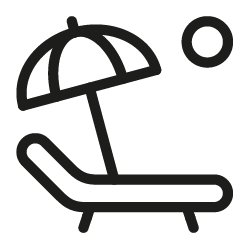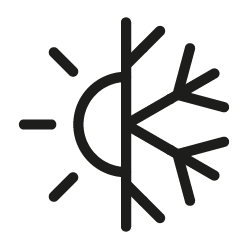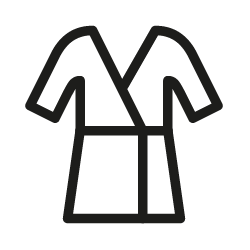Kronos
Panoramic Deluxe Suite with sea view, terrace and garden

WELCOME DRINK

Breakfast In Room

FREE WI-FI

Sea view

Bathroom with chromotherapy shower

Jacuzzi on the terrace

Private external garden equipped with shower, deckchairs, table, chairs and sunshade

Common panoramic garden with exclusive access, equipped with tables, chairs and deckchairs with solarium and breakfast area

Safety box

Air conditioning

ASCIUGACAPELLI

Hair dryer

Kit For The Solarium (Towel, bathrobe and slippers)

Ultra HD flat screen TV

FREE MINIBAR

Telephone connection with the Reception

Laundry service
In Greek mythology he was the youngest of the Titans , son of Uranus, the Sky, and Gaea, the Earth. According to Hesiod’s Theogony , since Uranus held his children captive, because he was afraid of losing the world domination, Cronus mutilated his father with the scythe given to him by his mother. From the blood that fell to the ground, the Erinyes, the Giants and the Nymphs were born, who then gave rise to a human lineage. Aphrodite was born from the limb that fell into the sea.
Spouse of Rhea, fearing that his children would in turn deprive him of power, as had been predicted, Cronus devoured them as soon as they were born, until Rhea managed to save the sixth, Zeus, giving him to devour a stone wrapped in swaddling clothes instead of the child . Zeus, grown up, forced his father to reject the five swallowed children, Hestia , Demeter , Hera, Ades , Poseidon , and with them he fought against Cronus and the other Titans in the Titanomachy. Eventually they were relegated to Tartarus, while Zeus became Lord of Olympus. According to another version of the myth, Cronus, after having reigned over the Earth in the first happy period of humanity, became the ruler of a fantastic world beyond the inhabited earth, the Blessed Isles. Here he transformed himself into a good king, dedicated to the prosperity of his kingdom, a god of agriculture who ruled wisely. It was the mythical golden age, when it was always spring, there was an abundance of every fruit of the Earth, men and Gods lived together, there was no need to work, and wars never occurred.
Cronus was later identified with the Italian Saturn. Latin mythology narrates that Saturn, after being dethroned by Jupiter, settled on the Campidoglio, founded a village there which took the name of Saturnia. There was a temple where his statue was wrapped in chains because the Romans never wanted him to leave Rome, the Italy of the time was called ‘Saturnia tellus ‘ and its inhabitants ‘Saturnia gens’. In Rome in the month of December the Saturnalia were celebrated, which originally lasted only one day, December 17, then a whole week, from December 17 to 24 of each year.
During the Saturnalia , the roles of masters and slaves were reversed, the rules and moral constraints fell, and a kind of carnival king was elected. They coincided with the rest from agricultural work and therefore represented the temporary liberation from the hardships of work, from social constraints and from moral conventions.
The feast also served to wish the fertility of the earth and celebrated the primordial era in which it was believed that the ownership of land and goods was common and that there was no work, social conflicts or war.
Saturn’s wife, Opi, i.e. Opima, abundant, Goddess of the harvest, became the equivalent of Rhea. Saturn was the father, among others, of Ceres, Jupiter, Neptune and Pluto, as well as ” Picus “, the first king of Lazio.
In Greece Cronus is gloomy, solitary and afflicted by the dethronement by his son; in Italy Saturn is the king of the mythical Golden Age, benevolent, protector of agriculture and city builder, a civilizing hero. A myth tells that Saturn in chains lies in the depths of Lazio, locked up in a tomb. Whoever manages to find it will get the golden seed of which the God is the guardian.
Saturn had a temple in the forum where the state treasury was kept until the end of the republic, aerarium , together with the laws engraved on bronze tables, the decrees of the Senate, the insignia of the armies and a scale for weighing the metal.
A special section of the treasury consisted of the aerarium sanctius , containing the state’s metallic reserve (bronze, gold and silver), gems, jewels and the proceeds of the 5 per cent tax on the emancipation of slaves. That is until Julius Caesar violated the sacredness of the place by taking over the exchequer.
We still find traces of this myth of Cronus, as time that generates and devours, in commonly used words such as chronology, chronometer, isochrony or synchrony, while the current festivities of Christmas and Carnival are then linked to the ancient Saturnalia and on us still shines the planet of the rings, Saturn, which has as an astronomical symbol, a stylized representation of the sickle of the god of agriculture.

